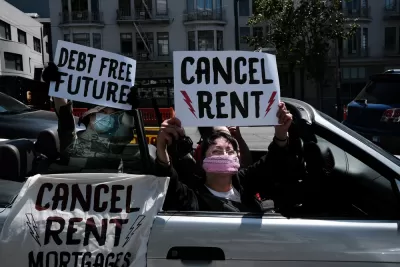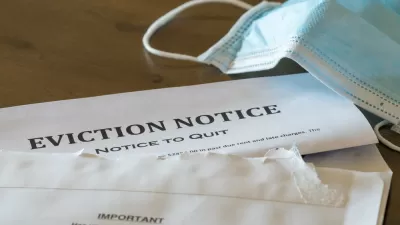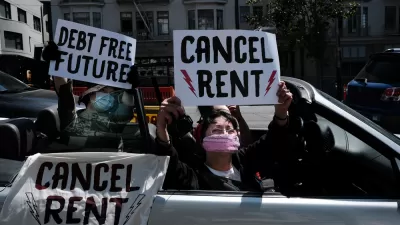The share of U.S. households facing rent debt is decreasing as the economy begins to recover from the pandemic, but rent debt is still concentrated by geography and demographics around the country.

A report by the National Equity Atlas and the Right to the City Alliance, "shows that 14% of all renting households are behind on payments, with the average amount owed being $3,400," reports Elliott Davis. The most recent data are for March, taken from from the U.S. Census Bureau's Household Pulse Survey and five-year 2019 American Community Survey, as well as the University of Southern California's Center for Economic and Social Research.
According to the data, Alabama, Louisiana, and Florida are the states with the highest proportion of households carrying rent debt. Hawaii has the highest rent debt per household. The report lacks data for Mississippi, North Dakota, South Dakota, West Virginia, and Wyoming due to insufficient data. The report also includes data for metropolitan areas.
Davis also notes the "extreme racial and socioeconomic disparities when it comes to who is behind on rent during the coronavirus pandemic." According to the report, "People of color make up 63% of the households that are in rent debt, and 78% are low-income households making less than $50,000, the data indicates."
As mentioned in articles covering the rent debt and eviction crisis in the early days of the pandemic, much of the economic stress of the pandemic has been absorbed by renters already struggling to pay the rent before the pandemic. "The National Equity Atlas' data shows that 46% of Black households, 45% of Latinx households and 42% of Native American households were "rent burdened and economically insecure" in 2019," explains Davis.
FULL STORY: Data Shows 5.7 Million U.S. Households Are Behind on Rent

Planetizen Federal Action Tracker
A weekly monitor of how Trump’s orders and actions are impacting planners and planning in America.

Chicago’s Ghost Rails
Just beneath the surface of the modern city lie the remnants of its expansive early 20th-century streetcar system.

San Antonio and Austin are Fusing Into one Massive Megaregion
The region spanning the two central Texas cities is growing fast, posing challenges for local infrastructure and water supplies.

Since Zion's Shuttles Went Electric “The Smog is Gone”
Visitors to Zion National Park can enjoy the canyon via the nation’s first fully electric park shuttle system.

Trump Distributing DOT Safety Funds at 1/10 Rate of Biden
Funds for Safe Streets and other transportation safety and equity programs are being held up by administrative reviews and conflicts with the Trump administration’s priorities.

German Cities Subsidize Taxis for Women Amid Wave of Violence
Free or low-cost taxi rides can help women navigate cities more safely, but critics say the programs don't address the root causes of violence against women.
Urban Design for Planners 1: Software Tools
This six-course series explores essential urban design concepts using open source software and equips planners with the tools they need to participate fully in the urban design process.
Planning for Universal Design
Learn the tools for implementing Universal Design in planning regulations.
planning NEXT
Appalachian Highlands Housing Partners
Mpact (founded as Rail~Volution)
City of Camden Redevelopment Agency
City of Astoria
City of Portland
City of Laramie





























